Managing Blogs, Submissions, Interviews, and Other Deadlines By Shauna Aura Knight
2 June 2015
Note From Rochelle
Dear Writers,
Happy June!
My kids are still in school and the weather remains chilly in Wisconsin, but I’m already in the summer mindset. I keep wishing I could skip work, sit on the porch under a big fluffy blanket, and write.
This summer, I’m planning to write as much as possible. I’m also beginning a website/business redesign. For that reason, I’m taking a break from weekly blogging. I’ll be welcoming guests to the blog to share their best writing tips and favorite summer reads. And the best news: they’ll also be giving away books.
If you happen to be a lucky book winner, I ask that you spread the joy by giving one of your gently used books to a local little free library. If you can, send in a picture of you making your donation, and I’ll include you in an upcoming blog post.
Today’s tip comes from Shauna Aura Knight and will help you keep track of your writing and submissions!
Happy Writing! Rochelle, the Write Now! Coach
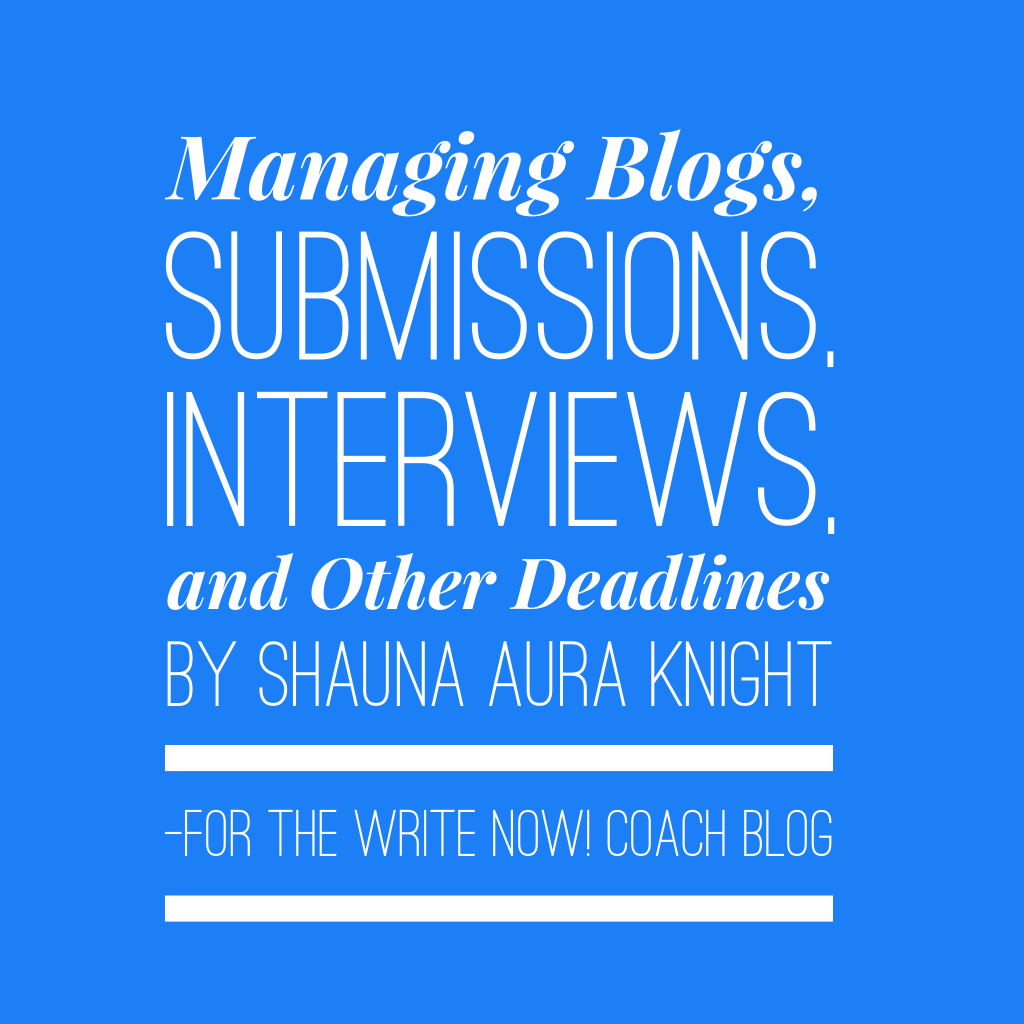
Are you overwhelmed with writing deadlines? I am. I’m a recovering procrastinator, and I’ve often run right up to a deadline or sent things in late. I’ve also read a call for submissions and thought, “Oh cool, I should write an article for that,” and then totally forgot about it. What are some ways to get deadlines under control?
There may be smartphone apps for this, but 1. My smartphone isn’t very smart, and 2. I’m more of a laptopper. My simple working tools here are Word documents, folders, and Google Calendar. Plus the occasional hand-written to do list on a piece of notebook paper, though I’m starting to try out Google Calendar’s to do list for some things.
Content Inventory First, it’s important to take an inventory of what projects you’re managing so you can categorize things. These are some things that I’m working on.
Nonfiction Writing:
+Books
+Articles for magazines
+My main blog on leadership, personal growth, facilitation
+Regular guest blogs
+Blog hops: Part of my blog, once every 3 months
Fiction Writing:
+Novels
+Novellas, short stories, and poetry for anthologies and magazines
+My fiction blog
+Blog hops: Part of my blog, 1-2per month.
+Guest blogs
+Interviews
Then add to this other social media, newsletters, podcasts, webinars…overwhelmed yet?
What Do You Get? If you’re not being paid to write an article, you should be getting something out of it. Blogging keeps your audience engaged. Writing articles or guest blogs, or getting short stories published, gets you exposure to a wider audience. You’ll want to know what return you’re actually getting on your articles, blog posts, short stories, etc. It’s another article entirely, however, to explore the art upselling and tracking your impact.
Tracking System I was already using tables/spreadsheets, but I was inspired by a marketing class offered by Kayelle Allen to create a few more, as well as additional folders, to help manage my writing. Then I began adding in important deadlines into my Google calendar.
Word Documents: The backbone of my submission tracking system is creating a Word document for every call for submissions. In the title, I have the publisher or publication name, the theme (if any) for a call for proposals, the deadline date if there is one, and the word count. In the document I have the further submission requirements.
Filenames: I use various notations to indicate if the submission pays or not. Or, if unpaid, I will sometimes research an online publication’s Alexa rankings. Typically I’m going to first submit my work to paid markets, or higher-ranked markets.
+“Strange Horizons Submissions 5k-9k”
+“Loose Id Holiday Oct 15 30K”
Folders: I keep these calls, and works in process, in subfolders of my “Working” folder. Subfolders include “Fiction,” “Poetry,” “Leadership,” “Metaphysical,” “Interviews” and more. When a piece is published, I have another set of folders under “Published.”
Spreadsheets: I have spreadsheets for different types of submission as well. I track what I send out, what gets rejected, and what gets accepted. I track publication dates, and I also track if I’m giving up any future copyright. Most magazines or anthologies require you credit them when reprinting the article/story elsewhere. Some require you to wait six months to a year before publishing the piece elsewhere. When I reprint something, I make a note of that in the spreadsheet. In other spreadsheets, I also capture links to interviews, podcasts, and reviews of my books. Pro Tip: When I update my spreadsheets, I also update links to these on my main website.
Online Calendar: I put any important submission deadlines on my Google Calendar, or any deadlines to return edits. Google Calendar events are useful as a reminder for interviews, guest blogs, and podcasts so that I can promote them on my own social media. Similarly, if I’ve signed up to be part of a book giveaway event or Facebook party or other social media event, I put that on my calendar if I’m expected to participate.
For weekly blog hops or promotional opportunities, I create an event on my calendar with all the relevant information about the hop. I write paranormal romance so there are a few weekly blog events like “My Sexy Saturday” that can be a great way to get exposure for my books. I frequently forget how fast these sneak up every week. Creating the Google Calendar event means that I not only can see it coming up on my calendar, but I can also just move it to the next week or month that I plan to participate and all the info stays put.
Now—putting all of this onto my Google Calendar does make my calendar pretty useless for anyone in my personal life. You may want to create a secondary calendar just for writing and promotion deadlines if you use this function to synch schedules with friends and family.
Pro Tip: I also attend festivals, conferences, and I vend my artwork, along with having the occasional social obligation, so I make sure that I have those live events on my calendar too so that I won’t schedule myself to do a podcast when I’m actually going to be vending at a festival, or I won’t be stuck writing an article in my hotel room or on a tablet at the airport.
Other Documents. I also have a document for each of my books with my blurbs, buy links, excerpts, and social media links for easy copy and paste. Similarly, I have another document with the dozen different versions of my bio and all my social media links. I use a different bio for promoting my metaphysical nonfiction, like my Dreamwork book, than I do for my paranormal romance and urban fantasy novels.
Adapting Your System Whatever system you use, make it consistent. Observe your own behavior over time and what works for you and what doesn’t. Don’t try to swim upstream. My spreadsheets are actually all tables in Word documents because I hate working in Excel. Work with a system that is closest to your own habits and you’ll have the most success. If your method isn’t working for you, use that to tweak your system.
*This article was previously published on the Author Entrepreneurship magazine.
 About Shauna Aura Knight.
An artist, author, and presenter, Shauna travels nationally offering workshops on facilitation, community leadership, and personal growth. Her work is inspired by the mythic stories of heroes and the shadows we each face. She is the author of The Leader Within, Ritual Facilitation, and Dreamwork for the Initiate’s Path. She’s a columnist for several blogs and magazines and her writing can be found in several anthologies.
About Shauna Aura Knight.
An artist, author, and presenter, Shauna travels nationally offering workshops on facilitation, community leadership, and personal growth. Her work is inspired by the mythic stories of heroes and the shadows we each face. She is the author of The Leader Within, Ritual Facilitation, and Dreamwork for the Initiate’s Path. She’s a columnist for several blogs and magazines and her writing can be found in several anthologies.
She’s also the author of urban fantasy and paranormal romance novels including Werewolves in the Kitchen, Werewolves with Chocolate, A Winter Knight’s Vigil, A Fading Amaranth, and The Truth Upon Her Lips. Shauna’s mythic artwork and designs are used for magazine covers, book covers, and illustrations, as well as decorating many walls, shrines, and other spaces. Shauna is passionate about creating rituals, experiences, spaces, stories, and artwork to awaken mythic imagination. Visit her online at: http://www.shaunaauraknight.com
Leadership Blog: https://shaunaaura.wordpress.com
Facebook: https://www.facebook.com/ShaunaAuraKnightRitualist
Portfolio: http://shaunaknightarts.wordpress.com
Twitter: https://twitter.com/Shauna_A_Knight
Write Now! Coach Rochelle Melander is an author, a certified professional coach, and a popular speaker. Melander has written ten books including Write-A-Thon: Write Your Book in 26 Days (And Live to Tell About It). As the Write Now! Coach, she teaches professionals how to write books fast, get published, and connect with readers through social media. Get your free subscription to her Write Now! Tips Ezine at https://www.writenowcoach.com.

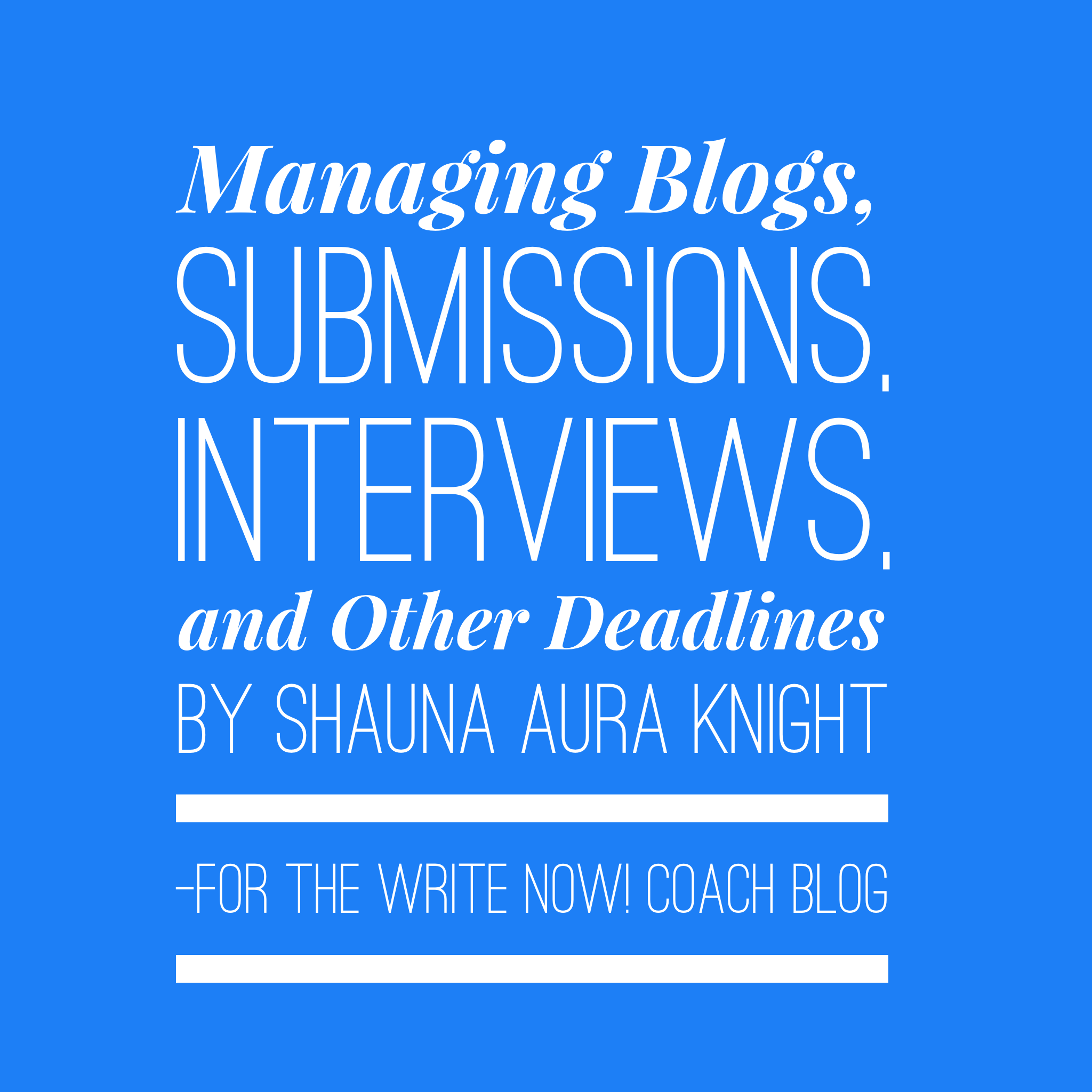

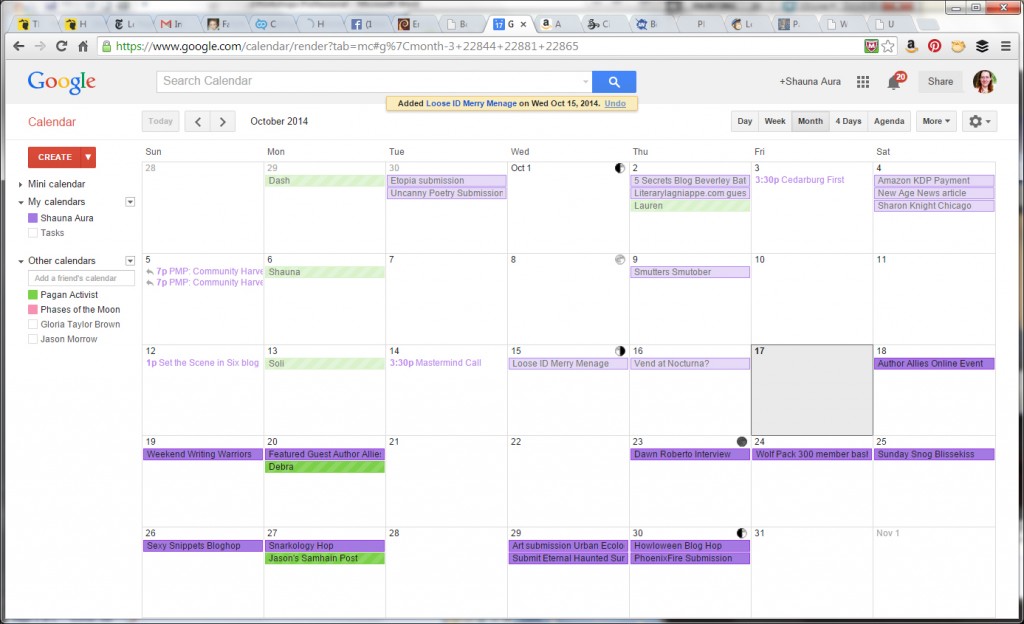
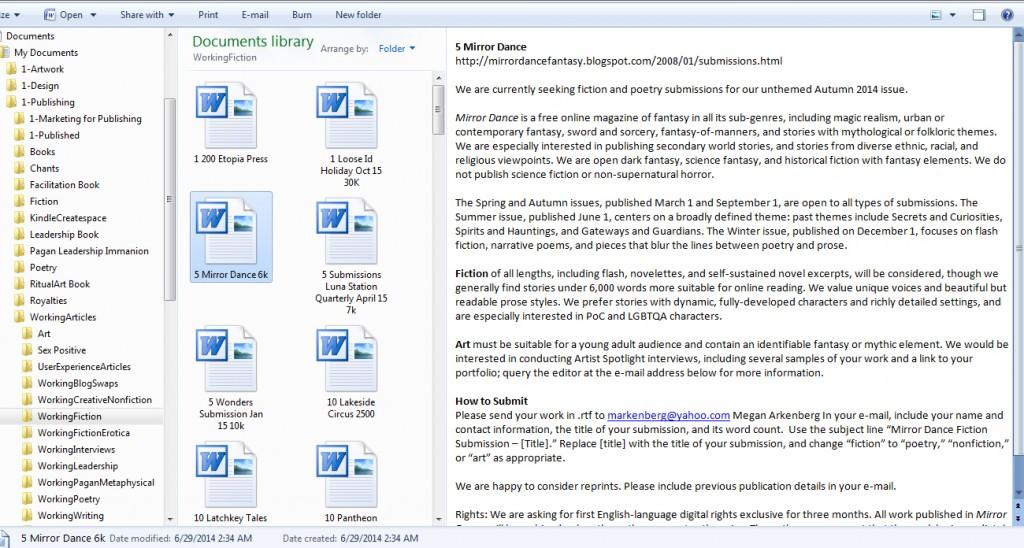
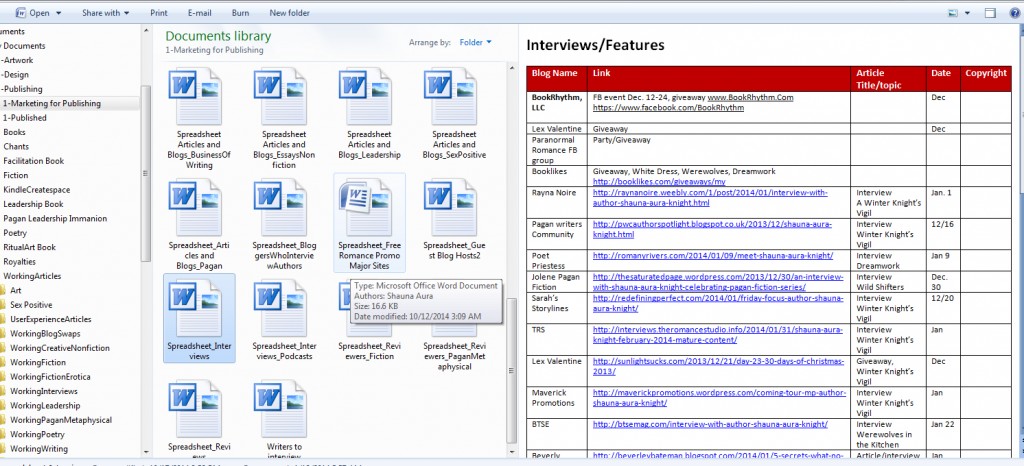








Whew, Shauna! I knew you were a busy writer, but reading this makes me feel tired.